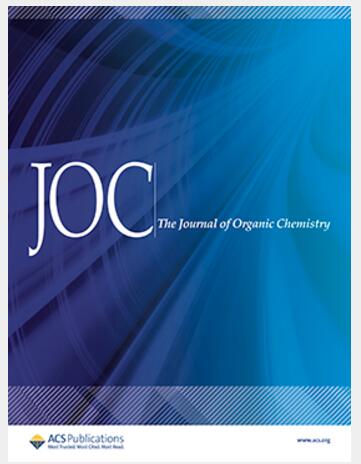1,2,3-苯并三嗪酮与炔的电化学级联反应组装3,4-二氢异喹啉-1(2H)-酮
IF 3.3
2区 化学
Q1 CHEMISTRY, ORGANIC
引用次数: 0
摘要
利用1,2,3-苯并三嗪酮与炔烃的电化学级联反应合成3,4-二氢异喹啉-1(2H)- 1,避免了加压H2、任何金属催化剂和化学计量氧化还原剂的使用。这条路线在两种反应物中都能承受广泛的官能团,并且可以在空气气氛下进行。通过对照实验和循环伏安图验证了连续阴极还原过程。此外,克级反应证实了这种环保方法在实际应用中的潜力。本文章由计算机程序翻译,如有差异,请以英文原文为准。

Electrochemical Cascade Reactions of 1,2,3-Benzotriazinones with Alkynes to Assemble 3,4-Dihydroisoquinolin-1(2H)-ones
An unexpected electrochemical cascade reaction of 1,2,3-benzotriazinones with alkynes to assemble 3,4-dihydroisoquinolin-1(2H)-ones has been developed, which avoids the use of pressurized H2, any metal catalysts, and stoichiometric redox agents. This route tolerates a wide range of functional groups in both reactants and can be performed under an air atmosphere. The process of continuous cathodic reduction was demonstrated by control experiments and cyclic voltammograms. Moreover, the gram-scale reaction confirmed the potential of this environmentally benign method for practical applications.
求助全文
通过发布文献求助,成功后即可免费获取论文全文。
去求助
来源期刊

Journal of Organic Chemistry
化学-有机化学
CiteScore
6.20
自引率
11.10%
发文量
1467
审稿时长
2 months
期刊介绍:
Journal of Organic Chemistry welcomes original contributions of fundamental research in all branches of the theory and practice of organic chemistry. In selecting manuscripts for publication, the editors place emphasis on the quality and novelty of the work, as well as the breadth of interest to the organic chemistry community.
 求助内容:
求助内容: 应助结果提醒方式:
应助结果提醒方式:


